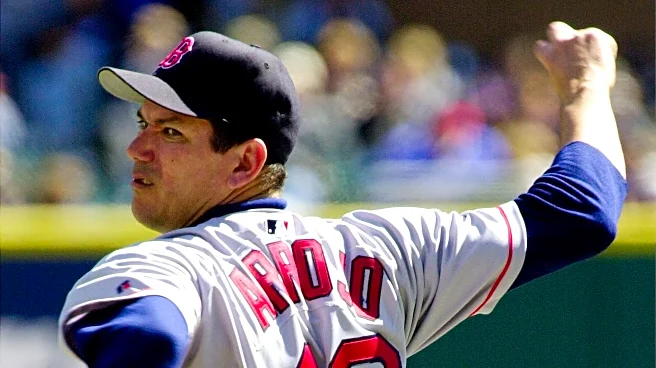Heading into the regular season, the 2000 Yankees had a three-game set with the Boston Red Sox at Fenway Park scheduled for September 8-10th, a series which the Yankees ultimately wound up sweeping. Following
that game, the Yankees would have a day off to return home for a set with the Toronto Blue Jays, while the Red Sox would have a travel day to allow them to get to Ohio for a series with Cleveland. Thanks to a rainout back on June 12th, however, both teams lost one of their final offdays of the season. They left Fenway together and headed to New York to wrap up their four-day, two-city series with one final matchup in the Bronx.
Unfortunately for the Yankees, their bats didn’t get the memo that they had to play a game.
September 11: Yankees 0, Red Sox 4 (box score)
Record: 82-59 (1st in AL East, 8.0 games ahead)
After three days of offensive futility in the normally offense-friendly confines of Fenway, the Boston Red Sox came out aggressive against Yankees starter Orlando Hernández. Trot Nixon led off the game by working a full count against El Duque, ultimately walking on seven pitches. José Offerman followed that up by sending a 1-0 pitch into the short porch — the first home run surrendered by a Yankee pitcher in seven games! While Hernández worked around a Carl Everett double to avoid further damage, the Red Sox already had themselves a 2-0 lead.
The second inning played out much the same way as the first. Brian Daubach led off the inning with a single; two batters later, Manny Alexander deposited the first pitch he saw over the wall next to Monument Park in left field. Nixon and Offerman each lined out to end the inning, but just an inning and a half into the game, Boston led 4-0.
At this point in the game, El Duque settled down. He retired the next eight batters he faced, and it wasn’t until the sixth inning that Boston began to threaten again. Nomar Garciaparra led off the inning with a double, advancing to third on a Dante Bichette one-out single that put runners on the corners. A Daubach walk proceeded to load the bases. Hernández got Jason Varitek and Alexander to strike out swinging, however, leaving the bases juiced. The next inning, manager Joe Torre turned to the bullpen, and Mike Stanton, Jeff Nelson, and Ted Lilly (making his season and Yankees debut) combined for one hit and five strikeouts across the game’s final three innings, keeping the Yankees offense within striking distance.
Not that it mattered, anyway. Boston starter Rolando Arrojo, a journeyman starter who entered the game with a 4.66 in eight starts with the Sox (5.61 overall), absolutely befuddled the Yankees lineup, who looked less like the defending World Series champs and more like a groggy teenager who remembered they had a presentation due just five minutes before the start of class. They recorded just five hits and struck out seven times in 7.1 innings. Not until the eighth inning did they even vaguely threaten, as David Justice led off with a walk and Derek Jeter reached on a one-out single that finally chased Arrojo from the game. Boston’s closer Derek Lowe, though, came in, got Paul O’Neill to ground into a 4-4-3 double play to end the eighth, then slammed the door shut in the ninth for his 32nd save and Boston’s 12th shutout of the season.
Students of history occasionally stumble upon historical happenstances that leave you a bit unsettled as you consider the course of history and your place within it. Twenty-five years ago, September 11th was just one day among many, with the Yankees’ and Mets’ respective divisional races the main story of the day. Unbeknownst to all at the time, though, this day would be the final time 9/11 was just a normal day in New York. Just 365 days later, nothing would ever be the same.
Read the full 2000 Yankees Diary series here.










